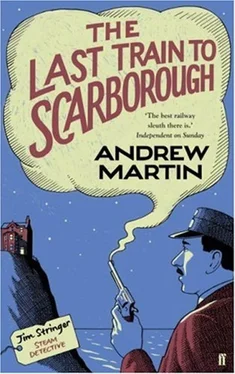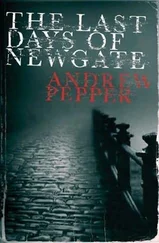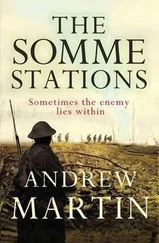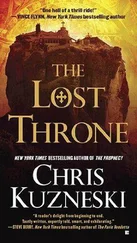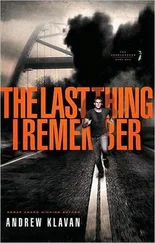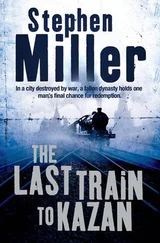'I think I'll sit by the river and watch the trains going over the Scarborough railway bridge. They've the new Z Class on the Scarborough branch. They're just running her in, you know.'
'What are you, Jim? Ten years old?'
'I'm pushing thirty, which is too late to be starting a new job.'
'It's not a job, it's a profession. You might come back here for a nap, then you've your office "do" at the Beeswing.'
'The Chief says he has an important bit of business he wants to mention to me at the Beeswing,' I said, and the wife frowned.
'But you've practically left.'
Silence for a space. I had deliberately stirred the wife up, and felt rather bad about it.
'It's not a dangerous bit of business, is it?' she enquired. Would she be so concerned if she knew that Robert Henderson might be put in the way of violence? I liked to think not.
A needle hung before me. It was the common run of needle – it had an eye in it – only much bigger, and it did not go away until I started to count the seconds of its persistence, whereupon it vanished immediately. I saw next a line of paint tins against a wall in a room. They were not opened, and I knew that I did not want to see them opened, for I did not like the smell of paint. Close by, I strongly suspected, was a rattling window and beyond that the sea, which was black with something… something starting with the letter B, and ending in S. The sea was black with butlers: dark-coated men bathing. No, couldn't be. That wasn't the word.
Now bells rang about me on the dark coal plain, and the floorboards over my head were being lifted one by one. It appeared that they were not nailed down, for they came away very easily. Two men worked at the job. Both wore rough guernseys and some species of gumboots, and as they worked they rose and fell with the coal plain, and with me. Above them, a night sky was gradually being revealed: a mighty and expanding acreage of stars and racing wisps of cloud. I fixed on one very bright star, and that was a mistake, for the act of watching it brought back the sickness, and the French word came to me: mal de mer. I had heard that somewhere of late.
As I watched in wonder, I counted the bells. Had there been eight strokes in all? One of the two men wore a hat that might have been a captain's peaked cap, but there was no braid and no badge, as though he wanted to keep back his identity. His face was brownish and square. The other's face, beard and hair were all grey, and he was now down on the coal with me, fastening up a tunic with two rows of brass buttons. The man who remained above, standing on the edge of the ragged skylight that he'd had a hand in making, shouted a question to the one standing over me, and I could not make it out, but I knew from the tone that he must be the governor, and I heard the reply: 'They're all aft, skipper.' He was foreign in some way, this second man. He put a bit of a'd' sound at the beginning of 'they're', in a way that made the word seem babyish. But he looked a hard case, as did the other.
Another bell was rung – a bell that existed in an altogether different world – and it brought me to wakefulness sitting alone in my best suit on the top deck of the Number Nine tram. Friday evening and the tram running along, and my memory doing so once again as well. We ran along under the York lamps and only a scattering of stars, making for the place where easternmost York came to a stop: the Beeswing Hotel. The conductor was hanging off the platform, and joshing with various street loungers that we passed, like a performer on a moving stage. His high, cracked voice floated up the staircase but hadn't kept me from sleep. I had not slept in the afternoon as the wife had suggested, and I was dead tired, for I'd been awake all night fretting about my meeting with Parker.
In fact, our 'conversation' had been just that, and we had not touched on the doings of Mr Buckingham, reasonable or otherwise. 'I have satisfied myself that you are not a fool, Mr Stringer,' Parker had said, but he'd taken two and a half hours about it, in the course of which he'd introduced me to every man in the office. He'd asked me a good deal about Lydia, and I wondered at first whether he was one of her not-so-secret admirers like Robert Henderson, but I decided he was more nervous of her than anything. 'She is a rather forward party,' he had said, which I thought rather forward of him. Then again, in the summer of i9i3 she had intercepted him on his bicycle in the middle of York, and put it to him that I might have a start in his office.
'How did she know it was me?' Parker had asked, towards the end of our interview. My answer was pretty well-greased. I told him he was a famous York character, often mentioned in the Yorkshire Evening Press as chairing the police court or speaking at society events, or addressing the Historical Society on the Merchant Adventurers of York, on which he was an expert.
'Yes, but there's never a photograph, is there?'
That was true enough. The Press only ran to photographs for convicted murderers.
'… So how did she know?'
The truth was that Mr Parker had made the mistake – if that's what it was – of bicycling out to Thorpe-on-Ouse one summer's evening. As he went on his stately way along the high street, Harry had called out, 'That's an Ai bike!' It was one of the best made: a Beeston Humber. As Harry went on about the bike – he was excited over the expanding sprocket on the rear, which gave half a dozen different gearings -1 explained to the wife about the rider: about how he was the star of the police court, the top man in the office to which I often took our witness statements should a prosecution be under consideration. The wife had taken note of the man, or perhaps most particularly the bike, and flagged it down in central York not a week later, just as people stop the knife grinder on his bike when they want something sharpened.
As we clattered on over the new-laid tram rails, I saw from the windows that a light rain was falling, and the wind getting up. After the stop at the Spotted Cow, I caught the whiff of the gas works at Layerthorpe, and heard drunken chatter coming up the stairs. I turned about and saw Constables Flower and Whittaker from the York police office, the conductor shouting some jest up after them. I'd known that Whittaker lived somewhere hereabouts. They were on their way to the 'do' but half canned already. They nodded along the gangway when they saw me, but took care to sit well short of where I was.
Everyone likes having the top deck to themselves, and the arrival of Flower and Whittaker annoyed me. I knew they thought me a queer fish, and they could never quite hide the fact. I tried to imagine myself as they saw me: a railway copper genuinely keen on railways – that marked me down as a nut, for a start. Neither Flower nor Whittaker would have cared a rap for the Class Z.
I was in addition a plain suit man – the only one in the office just then – and they were uniformed. I was their superior, and Chief Inspector Weatherill's favourite into the bargain. But being the Chief's favourite… well, it came with complications. He had a great liking for danger and excitement but, since he was nearly seventy, his days of experiencing bother directly were about done. So he put all the trouble my way, perhaps suspecting I enjoyed it as much as he had. Or was it just that he thought I had the makings? That I might be trained up to enjoyment of tangling with the really bad lads if only I was given enough experience in that line? I didn't know, and it certainly wouldn't do to ask. The Chief was a force of nature: you took what came from him.
I'd had the solving, after a fashion, of three murders, while the constables' quarry was of the order of fare evaders, card sharpers and makers of graffito on carriage windows. I had a wife who went out to work, and who thought herself superior. She was one of those suffragettes, very likely a bomb thrower in the making, and on top of all that I was practically a solicitor already, and the lawyers were the enemy. They decided on who we could or could not go after, and in the serious cases they took the prosecution – and the victory, if it came – all for themselves.
Читать дальше
